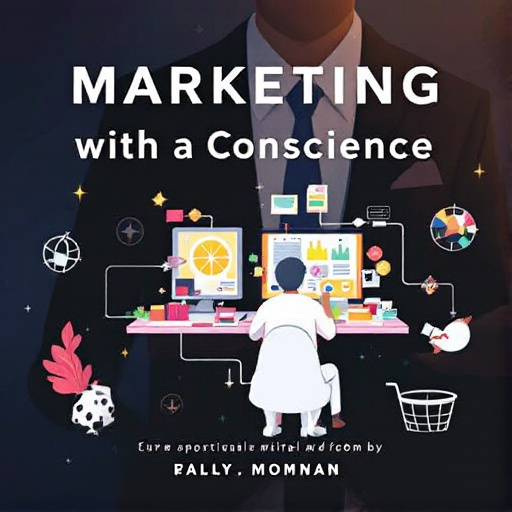Featured Articles
- 12 Innovative Guerrilla Marketing Tactics to Explode Your Brand Visibility Without Breaking the Bank
- How Sensory Branding Taps Smells and Sounds to Forge Deeper Emotional Bonds with Customers
- Marketing with a Conscience: How Brands are Embracing Ethical Dilemmas to Drive Consumer Loyalty
- The Rise of Eco-Conscious Branding: Turning Green Ethics into Marketing Gold
- The Surprising Role of Memes in Shaping Modern Brand Strategies: A New Frontier in Business Marketing
Marketing with a Conscience: How Brands are Embracing Ethical Dilemmas to Drive Consumer Loyalty
Marketing with a Conscience: How Brands are Embracing Ethical Dilemmas to Drive Consumer Loyalty
In a world where consumers are increasingly mindful of societal issues, brands are turning ethical dilemmas into marketing opportunities that foster loyalty. By adopting marketing strategies rooted in conscience and responsibility, companies are not only boosting their bottom line but also creating long-lasting connections with their customers.
The Rise of Conscious Consumerism
Let's face it: today's consumers are savvy. A 2023 study by Nielsen found that 66% of global consumers are willing to pay more for sustainable brands. Nielsen observed that this trend isn't just a phase—it's a shift in purchasing behavior driven by a desire to see brands align with their values.
What Does It Mean to Market with Conscience?
Marketing with a conscience means incorporating ethical considerations into every layer of business strategy: from sourcing materials sustainably, using fair trade practices, to transparent labor conditions. It’s about asking the age-old question, “What’s in it for the community?” rather than solely, “What’s in it for me?”
The Power of Storytelling
Remember the story of TOMS shoes? The "One for One" initiative not only provided a pair of shoes for every pair sold but also allowed consumers to connect on an emotional level. Buying a pair of TOMS wasn't just a purchase; it was a conscious choice to help someone in need. TOMS became a case study in storytelling that resonated with consumers craving purpose-driven brands. As a result, TOMS generated a whopping $300 million in revenue by 2018.
Challenging Ethical Dilemmas: A Conversational Approach
Now, picture this: you’re at a coffee shop, sipping your soy latte, reading the latest marketing report. Suddenly you stumble across a detail that makes you cringe: a certain beloved coffee brand has been implicated in unethical sourcing practices. What do you do next? Many might consider boycotting the brand entirely. But here's the catch—brands that own up to their mistakes and communicate authentically can turn crises into opportunities for growth. Ethical dilemmas can ignite conversations that bond brands with their consumers.
Brands That Stand By Their Values
Take Patagonia, for example. This outerwear brand famously declared, “Don’t buy this jacket” in an ad campaign encouraging consumers to think twice about their shopping habits. Instead of leveraging their ethical stance solely for profit, they positioned themselves as a brand that prioritizes sustainability over sales. More astonishing is that Patagonia has seen continued growth in revenue over the years because consumers appreciate its authenticity and commitment to environmental activism.
Why Are Ethical Brands Winning? Spoiler: Trust
Consider this: 89% of consumers are likely to switch to a brand associated with a cause they care about. When customers trust a brand, they become more than just passive consumers; they become advocates. Advocacy drives loyalty. Brands that frame their narratives around social issues build emotional bonds with consumers that can stand the test of time.
Making It Humorous
Here’s a witty thought: if a tree falls in a forest and no one hears it, does it really make a sound? Well, if a brand goes green and no one cares, are they even trying? It’s like throwing a party where only the eco-friendly snacks are invited. People love a good laugh just as much as they love a good cause! Brands with a sense of humor are memorable — just ask Ben & Jerry’s, whose quirky flavors and hilarious marketing campaigns make them a household name (and a crowd favorite).
The Impact of Technology on Ethical Marketing
With advancements in technology, the ability to scrutinize brands has never been easier. Websites like GoodGuide and Ethical Consumer provide ranking systems for companies, allowing consumers to consider ethical implications before making a purchase. In a study conducted by the Harvard Business Review, 70% of consumers changed their purchasing decisions based on these ratings. It's a mighty force, and brands that adapt will not just survive but thrive.
Case Studies Worth Noting
Case studies illustrate the essence of conscience-driven marketing. Warby Parker, an eyeglass retailer, disrupted the eyewear industry with its Buy a Pair, Give a Pair initiative, donating a pair of glasses for every purchase. By openly living its values, Warby Parker achieved a market valuation of $3 billion in just ten years. The elements that drove success? Transparency, social responsibility, and a sharp understanding of consumer needs.
Changing Consumer Behavior through Authenticity
It’s crucial to recognize the shift in consumer values. A survey conducted by Accenture showed that 63% of consumers prefer to buy from companies that stand for a purpose that reflects their values. Think about that the next time you fill your cart online. Are you buying just a product, or are you investing in a brand that resonates with your belief system?
How Brands Can Align With Ethical Marketing
The key to effectively embracing this marketing trend is authenticity. Brands can't just slap a ribbon on their packaging and call it a day; they must integrate ethics into their core practices. Here’s a thought experiment: If your brand vanished tomorrow, how would the world notice? Would there be lasting effects, or would people throw away the ‘green’ package and continue their lives as usual?
Humor and Heart: Finding the Balance
Let’s mix things up with some humor again: Imagine if brands were like roommates. You’d want the one who respects house rules (ethical practices) over the one who steals your food (cowers behind false claims). It’s the balance of humor and heart that keeps your brand approachable yet profound.
Statistics Speak Volumes
Did you know that ethical marketing can also be a lucrative business strategy? According to a report from Gartner, companies that prioritize customer experience, which includes ethical practices, can outperform their competition by 80% in revenue. Becoming a purpose-driven brand isn’t just good for the soul; it’s also excellent for business.
The Future of Marketing with a Conscience
Marketing with a conscience isn't a mere trend; it’s a fundamental shift that’s here to stay. The landscape is transforming, with brands realizing that engaging ethically with consumers fosters brand loyalty that is nearly impossible to break. By mastering the delicate balance between advocacy and profitability, brands that embrace this mindset are set to thrive. And the equation is simple: genuine connections equal lasting loyalty.
The Closing Note: Why It Matters
As a 25-year-old writer with a passion for ethical marketing, I’m excited to see brands challenge norms positively. Our generation is ready to stand behind those who stand for something. The beauty of marketing with a conscience is that it paves the way for future businesses to adopt similar practices, ensuring we foster a world where brands serve as catalysts for change instead of mere profit-makers.
In the words of Simon Sinek, “People don’t buy what you do; they buy why you do it.” In 2024 and beyond, let’s champion brands that embrace authenticity as a means of fostering loyalty and driving social change. The more we demand accountability and transparency, the more the market will respond, shaping a world in which brands and consumers thrive together.



